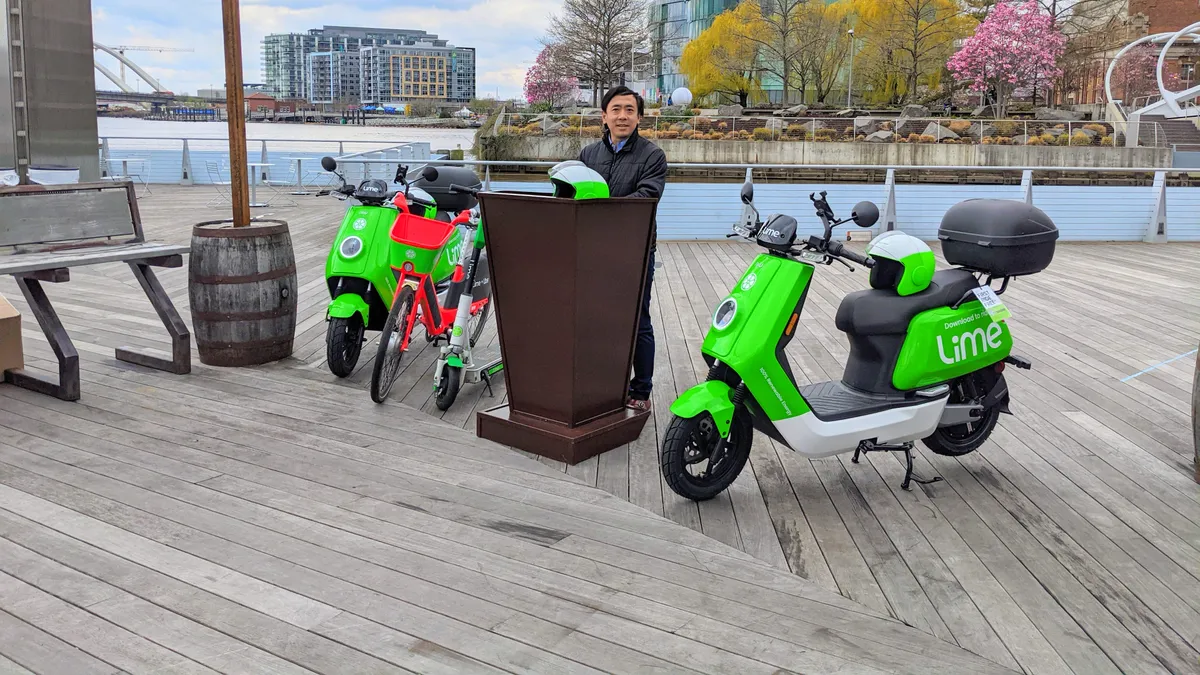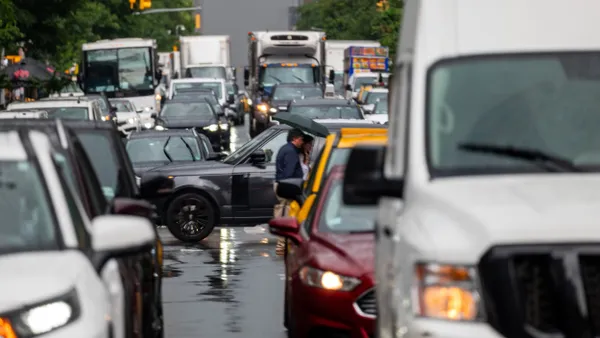Dive Brief:
- Lime launched its new electric mopeds last week with an initial 100-vehicle deployment in Washington, DC, joining its existing fleet of scooters and electric bikes in the city. The company said it anticipates deploying 600 mopeds in DC.
- Lime has taken a "comprehensive approach" to moped safety, according to the company. This includes a mandatory in-app education course for every new rider, developed in partnership with the Motorcycle Safety Foundation (MSF); a required helmet selfie check; sensors to determine if a rider has removed a helmet from the case for use; and facial recognition technology to determine if there is a match between the rider’s face and driver's license photo.
- The mopeds can reach up to 28 miles per hour and can travel 87 miles on a single charge, with each vehicle containing two helmets, for the driver and a passenger. Lime expects to deploy the mopeds in Paris in the near future, ahead of a wider rollout in other cities.
Dive Insight:
The introduction of shareable mopeds in cities has not always gone smoothly, especially in regards to safety. Revel was the first company to embrace the vehicles, rolling out a New York City fleet in 2018, followed by launches in DC, Miami and other cities. But Revel was forced to pull out of New York after a series of fatal crashes in 2020.
The company returned to New York City shortly after, making a number of safety improvements that include requiring in-app training and helmet selfies before riding. In a previous interview with Smart Cities Dive, Revel CEO and co-founder Frank Reig said there is "not a two-wheeled micromobility company that even touches the amount that we have done, both from launch and also changes in 2020."
Lime CEO Wayne Ting said in an interview at the company's moped launch in Washington, DC, that Lime's commitment to safety is what will set its mopeds apart and help them become a part of cities’ transportation networks.
"I think that, frankly, a lot of the existing players haven't taken [safety] seriously enough," Ting said. "That is going to be a big reason, ultimately, on whether or not this is accepted as a mobile app. And so that's probably the biggest differentiation."
Ting said the company has been developing its safety technology for about a year, after company officials pledged to "commit to making this a priority." The company also said its mopeds will be powered by 100% renewable energy, supporting its goals to promote clean transportation and achieve a zero-emission fleet by 2030.
Company officials said they chose Washington, DC, as the first U.S. city for its moped service because the city "already embraced" micromobility. DC appears to support such efforts: The District Department of Transportation announced late last month it would extend its moped pilot program through the end of the year.
"Part of the goal of the DC program is to learn," Ting said. "We're going to learn a lot more about how riders use it, where are the places where we can improve. And once we are in the right place, we're going to be scaling across more cities."
Lime turned heads and attracted criticism from some competitors recently following its announcement late last year that it achieved its first profitable quarter. The announcement made it the first micromobility company to make such a statement publicly.
"Veo was the first truly profitable micromobility company — and we have been since May," said Candice Xie, co-founder and CEO of the e-scooter company, in response to Lime's announcement. "I must have forgotten to take a global victory lap for achieving the most basic fundamental of business: bringing in more money than we spend," Xie wrote in a Medium post.
Ting said Lime has plans to introduce more vehicles, in addition to its existing products, later this year in a bid to reduce car trips. He declined to go into specifics about what riders can expect, except to note that its current vehicles are all open-air and will be weather-dependent. "This is not the end," Ting said.











